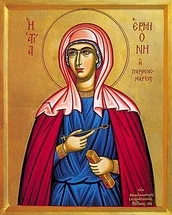Great and Holy Tuesday: The Hymn and Life of Saint Kassiani
My beloved spiritual children in Christ Our Only True God and Our Only True Savior,
CHRIST IS IN OUR MIDST! HE WAS, IS, AND EVER SHALL BE. Ο ΧΡΙΣΤΟΣ ΕΝ ΤΩ ΜΕΣΩ ΗΜΩΝ! ΚΑΙ ΗΝ ΚΑΙ ΕΣΤΙ ΚΑΙ ΕΣΤΑΙ.
+++
ON GREAT AND HOLY TUESDAY THE FOLLOWING HYMN OF SAINT KASSIANI IS CHANTED
+
"O Lord, the woman who had fallen into many sins, perceiving Thy Divinity, fulfilled the part of a myrrh-bearer, and with lamentations she brought sweet-smelling oil of myrrh to Thee before Thy burial. 'Woe is me,' she said, 'for night surrounds me, dark and moonless, and stings my lustful passion with the love of sin. Accept the fountain of my tears, O Thou Who drawest down from the clouds the waters of the sea. Incline to the groanings of my heart, O Thou Who in Thine ineffable self-emptying hast bowed the heavens. I shall kiss Thy most pure feet and wipe them with the hairs of my head, those feet whose sound Eve heard at dust in Paradise and hid herself for fear. Who can search out the multitude of my sins and the abyss of Thy judgments, O Savior of my soul? Despise me not, Thine handmaiden, for Thou hast mercy without measure."
+
Who was Saint Kassiani
Saint Kassiani is one of the first female composers, a poet and hymnographer, whose scores are both extant and able to be interpreted by modern scholars and musicians. Approximately fifty (50) of her hymns are extant and twenty-three (23) are included in the Orthodox Church liturgical books. The exact number is difficult to assess, as many hymns are ascribed to different authors in different manuscripts and are often identified as anonymous. In addition, some 789 of her non-liturgical verses survive. Many are epigrams or aphorisms called 'gnomic verse.' 'I hate the rich man moaning as if he were poor.'
Saint Kassiani was born 805 A.D. in Constantinople into an wealthy family and grew to be exceptionally beautiful and intelligent. Three Byzantine chroniclers, Symeon Metaphrastes, George the Monk (a.k.a. George the Sinner) and Leto the Grammarian, claim that she was a participant in the 'bride show' organized for the young bachelor Theophilos the Iconoclast (enemy of holy icons) by his stepmother, the Empress Dowager Euphrosyne. Smitten by Kassiani's beauty, the young Emperor approached her and said: "through a woman [came forth] the baser [things],' referring to the sin and suffering coming as a result of Eve's transgression (ancestral sin). Kassiani (Kassia) promptly responded by saying: "and through a woman [came forth) the better [things]," referring to the hope of salvation resulting from the incarnation of Christ through the Theotokos (Mother of God) and Ever-Virgin Mary. According to tradition, the dialogue was: "Εκ γυναικός τα χείρω." - "Και εκ γυναικός τά κρείτω."
His pride wounded by Saint Kassiani's terse rebuttal, Theophilos rejected her and chose Theodora as his wife.
The next we hear of Saint Kassiani is that in 843 A.D. she founded a Women's Monastery in the west of Constantinople, near the Constantinian Walls, and became its first Egoumenissa(Abbess). Although many scholars attribute this to bitterness at having failed to marry Theophilos and becoming Empress, a letter from Theodore the Studite indicates that she had other motivations for wanting a monastic life. It has a close relationship with the nearby monastery of Stoudios, which was to play a central role in re-editing the Byzantine liturgical books in the 9th and 10th centuries, thus ensuring the survival of her work.
Tradition says that in his later years the Emperor Theophilos, still in love with Kassiani, wished to see her one last time before he died, so he rode to the monastery where she resided. Kassiani was alone in her cell, writing her now famous hymn, when she realized that the commotion she heard was because the imperial retinue had arrived. Being now devoted to God in her monastic life, Saint Kassiani fled from her cell and hid, leaving the unfinished hymn on her writing desk. Theophilos was directed to her cell and entered it alone. Not finding Kassiani, he turned to leave when he noticed papers on the desk and read what was written upon them. When he was done reading, he sat and added one line to the hymn; then he left--never to see Kassiani again. The line attributed to the Emperor is "those feet whose sound Eve heard at dusk in paradise and hid herself for fear." When the Emperor and his party departed from the monastery, Saint Kassiani returned to her cell, discovered what Theophilos had written, and finished the hymn now popularly known as "The Hymn of the Sinful Woman."
She wrote many hymns for liturgies, the most famous being the eponymous Hymn of Kassiani, chanted every Great and Holy Wednesday (liturgically, actually chanted in the evening of Great and Holy Tuesday)
+++
Our wonderful Byzantine Chorus will be chanting this most inspiring hymn this evening at Saint Andrew. It is my prayer that all of you will join us to hear it and be truly edified.
_________________
"Glory Be To GOD For All Things!"--Saint John Chrysostom
+
With sincere agape in His Holy Diakonia,
The sinner and unworthy servant of God
+Father George

